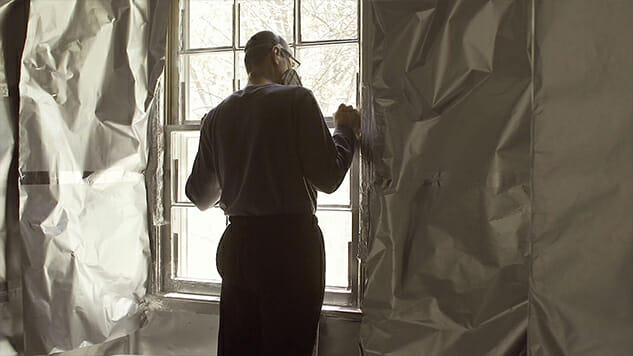The Sensitives
(2017 Tribeca Film Festival Review)
Photo: Tribeca Film Festival
There’s little feeling more painful than not being believed. Whether mental, physical or somewhere in between, no malady can ever injure as deeply as incredulity from a loved one or from a medical professional, when all you want—from the bottom of your soul—is to be healthy. Director Drew Xanthopoulos meets people for whom this condition is reality in his harrowing documentary The Sensitives.
The film’s subjects suffer from untreatable, incurable hypersensitivity to the modern world. Chemicals, electricity, radio waves, cell phones: Their conditions are debilitating but not personality-erasing, just crippling enough to make life near-impossible without looking like they’re living a nightmare. Joe lives a seemingly normal suburban life were it not for the gas mask he wears or how heavily he relies on his supportive, silently-suffering wife, Lanie. She brings meals, cooked in the dark because of Joe’s aversion to artificial light, up to a foil-coated panic room on the second floor of their house. Then there’s Karen, living with her grown twins, Sam and Nathan, to whom she’s passed her sensitivities along, which means they horizontally compose acoustic music on mattresses and rely on Karen’s 96-year-old mother to bring groceries to their isolated home. There’s also Susie, an enterprising sort who’s become a disability advocate for her mysterious, skepticism-inducing disease.
The Sensitives sees its skeptics coming and bulldozes forward with archival footage of Susie before she moved to her sensitive-friendly community, wherein checks occur regularly for bug spray, carpet cleaner and other offenders. The frailty of Susie in the 1990s isn’t lost on us when we see how spry she’s become. When she travels to an advocacy conference, the toll the modern world takes on her exists somewhere between degenerative illness and a physical embodiment of all of modernity’s anxieties. And yet, the only brush with the medical community the film humors is embodied in Joe reading a study at his kitchen table that confirms that his condition exists. We’re given no more information about its treatment, its rarity or its true nature.
-

-

-

-

-

-

-

-

-

-

-

-

-

-

-

-

-

-

-

-

-

-

-

-

-

-

-

-

-

-

-

-

-

-

-

-

-

-

-

-








































